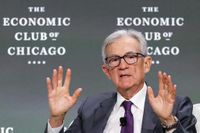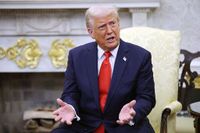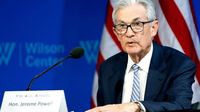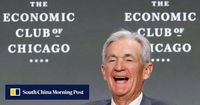In a striking display of discontent, President Donald Trump has called for the immediate termination of Federal Reserve Chairman Jerome Powell, criticizing the central bank's handling of interest rates. On Thursday morning, April 17, 2025, Trump took to his Truth Social platform to express his frustrations, stating that "Powell's termination cannot come fast enough!" This sentiment reflects Trump's ongoing dissatisfaction with Powell's performance, particularly regarding interest rate decisions that he believes should have been made sooner.
Trump's criticism comes at a time when he argues that the Federal Reserve should have already lowered interest rates this year to stimulate economic growth. He pointed out that the European Central Bank (ECB) is expected to cut rates again, suggesting that Powell should follow suit. In his post, he referred to Powell derisively as "Too Late," indicating his belief that the Fed chair has been slow to act during a critical economic period.
The tension between Trump and Powell is not new. Their relationship has been fraught since Trump nominated Powell for the position in 2017. The former president has frequently voiced his opinion that the Fed should prioritize low interest rates to foster economic expansion, particularly during his administration's boom years. However, Powell has maintained that the Fed's decisions must remain free from political influence to ensure that monetary policy serves the broader interests of the economy.
In a speech delivered just a day prior to Trump's comments, Powell addressed the Economic Club of Chicago, emphasizing the independence of the Federal Reserve. He stated, "Our independence is a matter of law...In our statute, we're not removable except for cause. We serve very long terms, seemingly endless terms. So we're protected in the law." This statement underscores the legal framework that protects the Fed from direct political interference, a principle that is crucial for maintaining the integrity of U.S. monetary policy.
Despite Trump's calls for Powell's termination, the Fed chair's term is set to last until May 2026, while his role as a governor extends until February 2028. Therefore, Trump does not have the authority to remove Powell from his position; he can only nominate a successor when the time comes. This limitation has not deterred Trump from publicly expressing his dissatisfaction, which some observers see as an attempt to undermine the Fed's authority.
Powell's recent comments have also highlighted the complexities of the current economic landscape, particularly in light of Trump's trade policies. The Fed has cut its key interest rate three times in the past year, bringing it down from 5.5 percent to 4.5 percent. However, Powell has cautioned that the impacts of tariffs imposed by the Trump administration could complicate the Fed's decision-making process. He remarked that the tariffs could lead to inflationary pressures, which would be exacerbated if rates were cut too quickly.
Trump's insistence on aggressive rate cuts has raised eyebrows among economists and policymakers. The dual mandate of the Federal Reserve is to maximize employment while keeping prices stable, targeting a 2 percent rate of inflation. Striking a balance between these goals is critical, especially as fears of a recession loom. Powell has indicated a willingness to remain patient and assess the impacts of Trump's policies before making any further adjustments to interest rates.
As the rate-setting Federal Open Market Committee prepares for its next meeting scheduled between May 6 and 7, 2025, the economic implications of Trump's trade war and its effects on inflation will be front and center. The committee will need to navigate a landscape filled with uncertainty, as ongoing negotiations with trading partners, particularly China, could introduce new challenges.
In the backdrop of this political and economic drama, Senate Minority Leader Chuck Schumer (D-NY) has weighed in on the matter, asserting that "an independent Fed is vital for a healthy economy—something that Trump has proved is not a priority for him." This statement reflects a broader concern among lawmakers about the potential consequences of political interference in monetary policy.
As Trump continues to voice his frustrations with Powell, the implications of this conflict extend beyond personal grievances. The independence of the Federal Reserve is a cornerstone of U.S. economic policy, and any erosion of that independence could have lasting repercussions for the economy. The Fed's ability to make decisions based on economic data rather than political pressures is essential for maintaining stability and confidence in U.S. financial markets.
In summary, Trump's call for Powell's termination highlights a significant clash between political ambitions and the established norms of central banking. As the economic landscape evolves, the Federal Reserve's ability to operate independently will be tested, and the outcomes of these tensions could shape U.S. monetary policy for years to come.







